
EUROPEAN JOURNAL OF PEDIATRICS
Scope & Guideline
Transforming child health with rigorous scholarship.
Introduction
Aims and Scopes
- Pediatric Infectious Diseases:
Research on infections prevalent in pediatric populations, their epidemiology, clinical characteristics, and management strategies. - Neonatology and Perinatology:
Focus on neonatal care, including management of preterm infants, respiratory distress, and long-term outcomes of neonatal conditions. - Chronic Pediatric Conditions:
Studies on chronic diseases affecting children, including asthma, diabetes, and autoimmune disorders, emphasizing treatment outcomes and quality of life. - Nutritional Science in Pediatrics:
Investigation into the nutritional needs and interventions for children, including studies on breastfeeding, dietary patterns, and food allergies. - Advancements in Pediatric Therapies:
Research on innovative treatment modalities, including pharmacological interventions, surgical outcomes, and the use of technology in pediatric care. - Mental Health and Developmental Disorders:
Exploration of psychological aspects affecting children, including ADHD, anxiety, and developmental delays, with a focus on early diagnosis and intervention. - Public Health and Policy in Pediatrics:
Studies addressing health policies, vaccination strategies, and the impact of social determinants on child health outcomes. - Innovative Diagnostic and Monitoring Techniques:
Research on the use of advanced diagnostic tools such as ultrasound, MRI, and biomarkers in the assessment and management of pediatric patients.
Trending and Emerging
- Telemedicine and Remote Care:
The rise of telehealth services has been accelerated by the COVID-19 pandemic, with increasing research on the efficacy and implementation of remote care in pediatrics. - Impact of COVID-19 on Pediatric Populations:
Ongoing research into the effects of COVID-19 on children, including mental health impacts, long COVID, and the implications of pandemic-related disruptions on child health. - Chronic Disease Management Innovations:
Emerging studies focus on innovative management strategies for chronic diseases in children, including diabetes and asthma, incorporating technology and personalized medicine. - Microbiome Research:
The importance of the gut microbiome and its influence on various pediatric conditions is gaining traction, with increased studies investigating its role in health and disease. - Mental Health Awareness and Interventions:
There is a growing emphasis on mental health in children, with more research addressing the identification, treatment, and prevention of mental health disorders. - Nutritional Interventions and Childhood Obesity:
Research on the role of nutrition in preventing and managing childhood obesity is trending, with studies exploring dietary patterns and interventions. - Pediatric Pharmacogenomics:
The exploration of genetic factors influencing drug responses in children is emerging, aiming to personalize medication regimens for improved outcomes. - Environmental Impact on Pediatric Health:
Research focusing on the effects of environmental factors, such as pollution and climate change, on child health is becoming increasingly relevant.
Declining or Waning
- Traditional Diagnostic Methods:
There appears to be a waning interest in conventional diagnostic approaches, as newer technologies and methodologies gain prominence in pediatric diagnostics. - Single Disease Focus Studies:
Research focusing solely on single diseases without considering comorbid conditions is becoming less prevalent, with a shift towards more holistic and integrated approaches to pediatric health. - General Pediatric Guidelines:
The publication of broad, non-specific pediatric guidelines is decreasing; there is a trend towards more tailored, condition-specific guidelines that address the complexities of pediatric care. - Over-reliance on Pharmacological Solutions:
There is a noticeable decline in studies promoting pharmacological interventions without considering lifestyle or non-pharmacological approaches, as holistic treatment modalities gain traction. - Invasive Procedures in Pediatrics:
Research on invasive procedures is decreasing, likely due to increasing preference for non-invasive techniques and monitoring methods in pediatric care.
Similar Journals
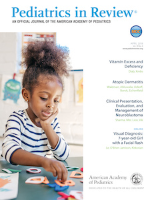
PEDIATRICS IN REVIEW
Nurturing the next generation of pediatric expertise.PEDIATRICS IN REVIEW, published by the American Academy of Pediatrics, is a prominent journal dedicated to advancing the understanding of child health and pediatric medicine. With an ISSN of 0191-9601 and E-ISSN 1526-3347, this journal offers a vital resource for pediatricians, researchers, and healthcare professionals seeking to stay informed about the latest trends and findings in the field. Though it operates under a subscription model, it maintains a reputable standing with a category quartile ranking of Q3 in Pediatrics, Perinatology, and Child Health as of 2023, reflecting its impactful contributions to the literature. Spanning over three decades since its inception in 1986, PEDIATRICS IN REVIEW continues to publish insightful reviews and articles that facilitate continuous learning and professional development. Its thoughtful coverage and established reputation make it an essential read for those engaged in pediatric research and clinical practice.
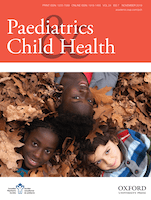
Paediatrics & Child Health
Exploring the frontiers of child health and well-being.Paediatrics & Child Health is a distinguished journal dedicated to advancing research and clinical practice in the fields of pediatrics, perinatology, and child health. Published by Oxford University Press Inc, it serves as a vital resource for healthcare professionals, researchers, and students involved in child healthcare disciplines. With an ISSN of 1205-7088 and an E-ISSN of 1918-1485, it features a comprehensive array of studies, reviews, and case reports that aim to enhance the understanding and treatment of pediatric populations. This journal holds a respectable position in the academic community, as evidenced by its Q2 ranking in the 2023 category of Pediatrics, Perinatology, and Child Health, alongside its Scopus ranking of #177/330 and a 46th percentile status. Though it does not offer open access, its rich content contributes significantly to the ongoing dialogue in child health, making it a key reference point for academics and practitioners alike. Since its establishment in 2000, the journal has continuously evolved, responding to the latest trends and research developments up until 2024, thereby fostering a well-informed pediatric community.
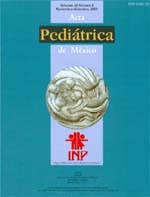
Acta Pediatrica de Mexico
Fostering Collaboration in Pediatric ExcellenceActa Pediatrica de Mexico, published by the Instituto Nacional de Pediatría, is a prominent open access journal dedicated to the field of pediatrics, perinatology, and child health. Established with the intent to foster research, collaboration, and dissemination of knowledge, the journal has been providing a platform for diverse studies and advancements in child health since its transition to open access in 2010. Based in Mexico, it caters to an international audience and aims to bridge gaps in pediatric healthcare through its rigorous peer-reviewed articles. Despite its current classification in the Q4 quartile of pediatrics, the journal is committed to improving its visibility and impact within the research community, currently ranked #265/330 in Scopus. The journal's focus on innovative practices and research aligns with its mission to enhance pediatric care and outcomes. Researchers, professionals, and students interested in the latest findings and trends in child health are encouraged to contribute and engage with this valuable resource, which encompasses a broad array of topics relevant to infant, child, and adolescent health through the year 2024 and beyond.

PEDIATRIC RESEARCH
Exploring the frontiers of child health research.Pediatric Research, published by SpringerNature, is a leading journal in the field of pediatrics, perinatology, and child health. With an impressive impact factor reflecting its stature, this journal has been integral in advancing research since its inception in 1967. With a placement in the Q1 category for Pediatrics, Perinatology, and Child Health, and ranking #30 out of 330 in Scopus, Pediatric Research is recognized for its rigorous peer-review process and commitment to disseminating vital findings that impact child health globally. The journal primarily serves as a platform for researchers, healthcare professionals, and students dedicated to exploring innovative solutions to pediatric health challenges. Although not an open-access journal, it provides valuable insights and research that contribute significantly to improving health outcomes for children. Based in the United States, with a global reach, Pediatric Research remains at the forefront of pediatric innovation and scholarship through 2024 and beyond.

MONATSSCHRIFT KINDERHEILKUNDE
Fostering critical discussions in pediatric medicine.MONATSSCHRIFT KINDERHEILKUNDE is a pivotal German journal dedicated to the fields of pediatrics, perinatology, and child health, published by Springer. With a longstanding history since its inception in 1952, this journal serves as a critical platform for disseminating cutting-edge research and advances in the study of child health and surgical practices affecting the pediatric population. As reflected in its 2023 Scopus rankings, the journal is positioned in the fourth quartile in both Pediatrics and Surgery categories, demonstrating a vital yet niche role within the scientific community. While it currently does not offer Open Access options, MONATSSCHRIFT KINDERHEILKUNDE remains an essential resource for researchers, professionals, and students looking to deepen their understanding of pediatric health issues. Its commitment to contributing to the field through peer-reviewed articles ensures that it continues to facilitate important discussions and developments until at least 2024.
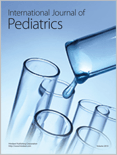
International Journal of Pediatrics
Connecting Ideas, Enhancing Lives in PediatricsInternational Journal of Pediatrics is a reputable peer-reviewed publication dedicated to advancing the field of pediatrics, providing a pivotal platform for researchers, clinicians, and academics to share innovative findings and comprehensive reviews. Published by HINDAWI LTD in the United Kingdom, this journal has embraced the open access model since 2009, ensuring that high-quality pediatric research is freely available to a global audience. With a solid Q2 ranking in the leading field of "Pediatrics, Perinatology and Child Health" and a commendable Scopus rank of #100 out of 330, the journal is committed to disseminating impactful knowledge that enhances child health and well-being. Covering a broad scope of topics, from clinical studies to public health initiatives, it welcomes diverse research contributions to foster collaboration and engagement within the pediatric community. The journal’s ongoing publication since 2019 reinforces its relevance and dedication to improving the lives of children worldwide.
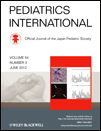
PEDIATRICS INTERNATIONAL
Exploring the frontiers of pediatrics and perinatology.Pediatrics International, published by Wiley, is a distinguished journal focusing on the fields of Pediatrics, Perinatology, and Child Health. With an ISSN of 1328-8067 and an E-ISSN of 1442-200X, it has made significant contributions to the understanding of pediatric health since its inception, maintaining a longstanding commitment to high-quality research from 1958 through to the present day. The journal falls within the Q3 category of the ranking system for its field and currently holds a Scopus rank of #184 out of 330, placing it in the 44th percentile of pediatric literature, thereby underlining its relevance in contemporary pediatric research. It aims to disseminate critical insights on child health, promote evidence-based practices, and foster collaborations among healthcare professionals. Researchers and practitioners in the field are encouraged to explore the wealth of resources available through open access options for enhanced reach and impact.

INDIAN PEDIATRICS
Fostering collaboration for improved child health outcomes.INDIAN PEDIATRICS is a renowned peer-reviewed journal dedicated to advancing the field of pediatrics, published by Springer India. Since its inception in 1964, the journal has been instrumental in disseminating high-quality research and clinical insights, addressing a wide array of topics including pediatric health, perinatology, and child development. With an esteemed categorization in the Q2 quartile in Pediatrics, Perinatology, and Child Health and a respectable Scopus ranking (Rank #123/330), INDIAN PEDIATRICS continues to play a vital role in shaping pediatric healthcare practices in India and globally. The journal aims to provide a platform for researchers, clinicians, and practitioners to share innovative findings, impacting policy and clinical practice. As an essential resource for professionals and students, it not only enhances knowledge but also encourages discussions in the ever-evolving realm of pediatric medicine. Engage with the latest research and contribute to the growing body of evidence aimed at improving child health outcomes.
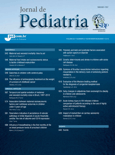
Jornal de Pediatria
Elevating child health standards through scholarly excellence.Jornal de Pediatria, published by the Sociedade Brasileira de Pediatria, stands as a premier platform for research and advancements in the field of pediatrics, perinatology, and child health. With an impressive Q1 category ranking in the 2023 metrics, this journal emphasizes the highest standards of scholarly excellence, evident in its Scopus rank of 51 out of 330 in its category, placing it in the 84th percentile. Since its establishment in 1945, its commitment to disseminating crucial research has evolved as it transitioned to an Open Access format in 2013, thereby enhancing the accessibility of vital pediatric knowledge to researchers, healthcare professionals, and students globally. Based in Brazil, the journal continues to foster an informed community around pediatric health issues, ensuring that findings lead to improved health outcomes for children and adolescents worldwide.
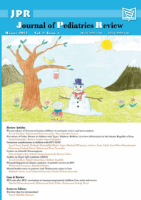
Journal of Pediatrics Review
Exploring the forefront of child health innovations.Welcome to the Journal of Pediatrics Review, an esteemed Open Access publication dedicated to advancing the field of pediatric medicine. Published by MAZANDARAN UNIVERSITY OF MEDICAL SCIENCES, this journal aims to disseminate high-quality, peer-reviewed research focused on the diverse aspects of pediatric healthcare, including perinatology and child health. With an ISSN of 2322-4398 and E-ISSN 2322-4401, the journal has positioned itself as a significant player in the field, notwithstanding its recent ranking of #327/330 in Scopus, reflecting its ongoing commitment to elevating research standards. Since its transition to Open Access in 2013, the Journal of Pediatrics Review has fostered global accessibility to groundbreaking studies, ensuring that healthcare professionals, researchers, and students alike can easily engage with contemporary pediatric issues. The journal’s dedicated efforts to enrich knowledge and foster collaboration make it an essential resource for anyone interested in the ongoing advancements in pediatric medicine.